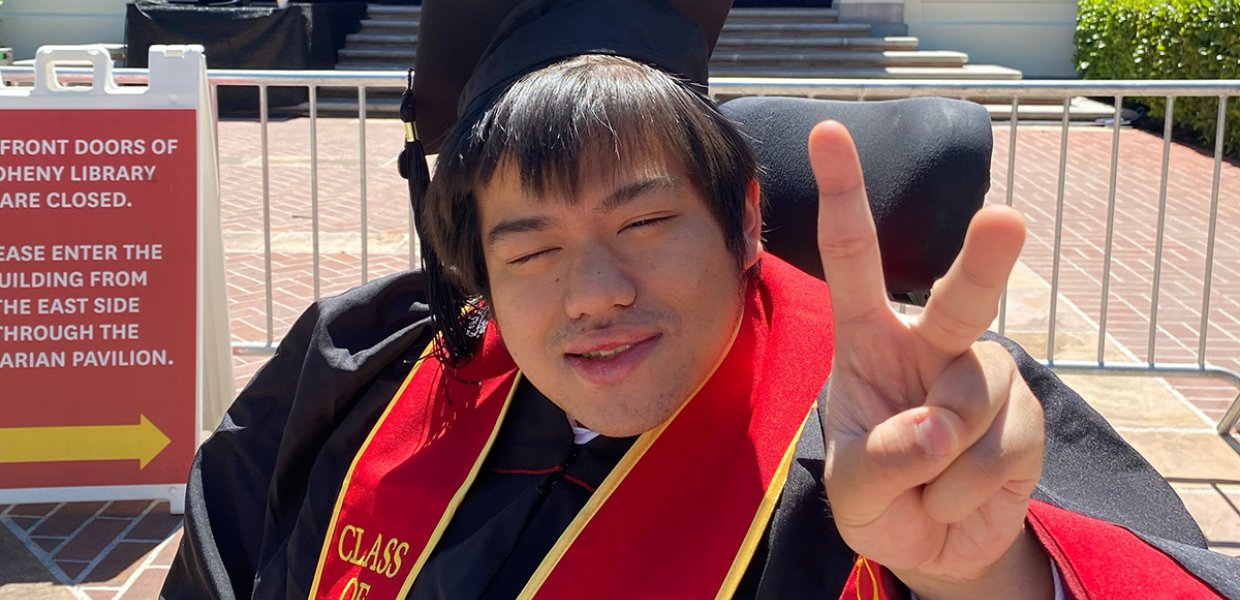Reo Sorensen has been a communicator for as long as he can remember.
At just age 9, he began giving speeches at charity events benefiting people with disabilities. Born with cerebral palsy, he uses a wheelchair, and has made it his purpose to speak out on behalf of his peers in the disability community.
“My primary focus has been always on disability and representation,” said Sorensen, a graduating senior in public relations at USC Annenberg. “My whole mission in life is to seek out narratives that in some small way make it easier for people with wheelchairs.”
Sorensen believes that the skills he gained during his undergraduate career have helped him develop both his voice and his ability to reach out and share his perspective. For better or worse, that growth came with struggle. Fortunately, Sorensen had the support he needed at USC Annenberg.
“This school loves me enough to enable me to be successful,” he said. “They really pushed me. And they always said, ‘How can we help? What can we do to better assist you?’”
Commencement will be a particularly significant time for Sorensen. USC Annenberg selected him as the banner bearer for its Class of 2022. On May 13, he will help lead the school’s academic processionals for both USC’s main ceremony and the school’s satellite ceremony.
“I’m just awestruck by the whole thing,” he said. “I’m very, very grateful.”
In his childhood, it took determination on the part of both Sorensen and his mother, Miyuki, to secure the type of education that would empower him to reach his full potential.
His family left his native Japan, where they concluded the educational services for students with special needs were inadequate. Even in Orange County, California, it was a fight to access appropriate learning opportunities. Elementary and middle school teachers predicted he would be unable to earn a high school diploma.
“People never believed in me,” Sorensen said. “You kind of start to internalize those negative thought patterns.”
The outlook changed when he enrolled in USC Hybrid High School, a Downtown L.A. charter school established by the USC Rossier School of Education. The need to fight for opportunity faded. And starting his baccalaureate years at USC Annenberg, he enjoyed a warm welcome.
“When I first met Dean Willow Bay, she said to me, ‘I can’t wait to see what you do here,’” Sorensen said. “USC and my mother, they never gave up on me. Sometimes I still pinch myself.”
His path wasn’t without turbulence, though. Difficulties during his studies in journalism dovetailed with Sorensen’s experiencing depression and anxiety. Things eventually turned around thanks to his Christian faith, mental health counseling and a change of scenery to his ultimate concentration in public relations.
“Sometimes you got to go through a hard time to find the light,” Sorensen said. “I want my fellow students to know, it’s OK to struggle. It’s OK to have bad days. And it’s OK to ask for help. USC Annenberg will be there for you.”
Alongside the support and the lessons learned through his coursework, the school has helped him achieve a hard-won sense of confidence.
“I’m learning the simple fact that I’m good enough,” Sorensen said.
In another dimension of his personal development, his aspirations have moved from a career in broadcast television to the arena of government and policymaking.
“I’ve evolved throughout the time I’ve been at USC,” he said. “I have more political leanings, although I’m not sure exactly what my future will look like. I know I’ll always fight for the rights of people with disabilities.”
As a progressive degree student, Sorensen will return to USC Annenberg for master’s studies in the Fall. In between, he’s excited to be one of 15 students in the school’s Maymester program, which will bring him to Washington, D.C., to make connections with industry professionals.
“It’s a high blessing that I get to go on this trip,” he said. “The experience is going to be a good bookend to my undergrad journey.”
Sorensen hopes his own story can shine a light on what’s possible for other students who use wheelchairs.
“Higher education needs more students with wheelchairs,” he said. “I hope that people read this article and say, ‘I could go to USC,’ or ‘My child could go to USC.’ It just takes that one thought, that one vision.”
